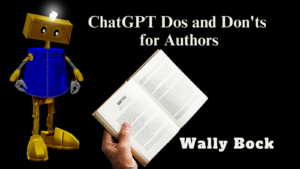Technology is neither good nor bad, but users make it so. Users always complete the innovation. When he invented the phonograph, Thomas Edison listed the ten uses he thought would be most important. Reproducing music was not on the list.
Users, of course, didn’t care much about what Edison thought. They kept finding ways to record and play music with his “serious” invention. It took Edison 20 years to admit that recording music was the primary use of the phonograph.
It will take a while before we know what changes systems like ChatGPT will bring to writing. It usually takes a new technology 15 to 20 years to reach full penetration and assimilation. The only thing we know for sure about that future is that it will be different from today.
For now, though, proceed as if we’re dealing with a new technology in the earliest stages of development and adoption. Here are some dos and don’ts to help you on your way. Let’s start with the don’ts.
Don’ts
Don’t trust ChatGPT. ChatGPT was not developed to reason or evaluate. It has no idea what’s right, only what’s out there, only what’s common. It cannot distinguish fact from opinion. So, check every fact and incident you’re thinking about using. Even its creators know that “ChatGPT sometimes writes plausible-sounding but incorrect or nonsensical answers.”
Don’t use ChatGPT copy in anything you claim as your own. ChatGPT may use someone else’s material in whatever it writes for you. That can lead you to be guilty of plagiarism.
Do’s
Use ChatGPT to stimulate your thinking. Ask it for ideas. You may not use any of the specific ideas the ChatGPT generates, but it’s bound to inspire you to come up with a few of your own. Ask ChatGPT to come up with ideas for blog posts. Ask it for ideas for a headline.
Learn how to create effective prompts. Effective prompts are the secret to getting the most from ChatGPT. The good news is that several ChatGPT sheet sheets are out there to help you master the skill. You won’t become a great prompter all at once. You’ll have to take some time and play around and get a sense of what works for you.
Investigate other AI platforms. ChatGPT isn’t the only game in town. I suggest you try Microsoft’s Bing, Google’s Bard, and several other platforms. They have different strengths and weaknesses, and you’ll need to experiment to find out what works for you.
Takeaways
Don’t trust ChatGPT.
Don’t use ChatGPT to create anything you claim as your own work.
Remember, “ChatGPT sometimes writes plausible-sounding but incorrect or nonsensical answers.”
Use ChatGPT to stimulate your thinking.
Learn how to create effective prompts.
Investigate other AI platforms.
Experiment and play with ChatGPT to master it.
